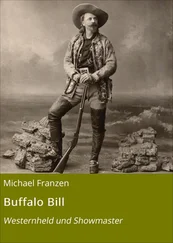Bill Buffalo - The Adventures of Buffalo Bill
Здесь есть возможность читать онлайн «Bill Buffalo - The Adventures of Buffalo Bill» — ознакомительный отрывок электронной книги совершенно бесплатно, а после прочтения отрывка купить полную версию. В некоторых случаях можно слушать аудио, скачать через торрент в формате fb2 и присутствует краткое содержание. ISBN: , Жанр: foreign_prose, foreign_antique, foreign_language, на английском языке. Описание произведения, (предисловие) а так же отзывы посетителей доступны на портале библиотеки ЛибКат.
- Название:The Adventures of Buffalo Bill
- Автор:
- Жанр:
- Год:неизвестен
- ISBN:http://www.gutenberg.org/ebooks/38840
- Рейтинг книги:3 / 5. Голосов: 1
-
Избранное:Добавить в избранное
- Отзывы:
-
Ваша оценка:
- 60
- 1
- 2
- 3
- 4
- 5
The Adventures of Buffalo Bill: краткое содержание, описание и аннотация
Предлагаем к чтению аннотацию, описание, краткое содержание или предисловие (зависит от того, что написал сам автор книги «The Adventures of Buffalo Bill»). Если вы не нашли необходимую информацию о книге — напишите в комментариях, мы постараемся отыскать её.
The Adventures of Buffalo Bill — читать онлайн ознакомительный отрывок
Ниже представлен текст книги, разбитый по страницам. Система сохранения места последней прочитанной страницы, позволяет с удобством читать онлайн бесплатно книгу «The Adventures of Buffalo Bill», без необходимости каждый раз заново искать на чём Вы остановились. Поставьте закладку, и сможете в любой момент перейти на страницу, на которой закончили чтение.
Интервал:
Закладка:
The Adventures of Buffalo Bill
FOREWORD
With the death of William Frederick Cody, at Denver on January 10, 1917, there passed away the last of that intrepid band of pathfinders who gave their lives to the taming of the West, a gallant company of brave men steadfastly pushing back the frontier year by year and mile by mile, and ceasing from their labors only when the young and vigorous life of the Pacific States had been linked up for all time with the older civilization of the Atlantic seaboard.
The fame of Colonel Cody, or Buffalo Bill as he was popularly called, recalls that of Daniel Boone, Davy Crockett, and Kit Carson, but he cannot be said to rank with those earlier heroes in point of actual national service. He played no large part in the upbuilding of our Continental Empire. Yet he was made of the same stern stuff, and, on his more circumscribed stage, he was a gallant and picturesque figure, a true superman of the brave old days. When, in 1883, Cody gave up his roving life and organized the Wild West show it meant that the Wild West itself was gone for good and all. Together with Boone, Crockett, and Carson his life rounds out the century of continental occupation, counting from the year Boone crossed the mountains into Kentucky to the final completion of the Union Pacific Railway. Boone was born in Pennsylvania and died in Missouri; Crockett was born west of the Alleghanies, in Tennessee, and died in Texas; Carson and Cody were born west of the Mississippi, and died in Colorado.
Perhaps the most picturesque period in Buffalo Bill’s life was his service as a rider in the service of the famous Pony Express just before the Civil War. This was perhaps the most perilous job that a man could undertake, and young Cody was barely fifteen years old. Yet he had had previous experience in Indian fighting and at the age of eleven he had killed his first Indian. Shortly afterward the Civil War began and Cody enlisted in the Union Army, serving as a scout. When the fighting was over he returned to the Far West. The transcontinental railways were in process of construction, a romantic episode in American history fittingly depicted in the glowing pages of Zane Grey’s The U. P. Trail . The builders of the Kansas Pacific Railroad wanted buffalo meat to feed their laborers and Cody undertook the contract. In eighteen months (1867-68) he killed 4,280 buffaloes, and thereby earned his title of Buffalo Bill.
In 1868 Cody rejoined the army as scout and guide, and quickly made a reputation as a man of infinite endurance and daring. He was attached to General Sheridan’s headquarters at Hays City, Kansas; and soon after reporting for duty he learned that the commander wanted a dispatch sent to Fort Dodge, a distance of ninety-five miles. The Indians had recently killed two or three dispatch riders on this route, and none of the scouts was anxious to take on the job. Even a promised bonus of several hundred dollars found no takers. Cody volunteered and made the dangerous trip in safety. But at Fort Dodge he found that the commanding officer there was very anxious to send dispatches to Fort Larned, and again the regular scouts shunned the task. On went Buffalo Bill to Fort Larned, sixty-five miles farther. About half-way he stopped to water his mule and the animal got away from him. For thirty-five miles Cody trailed the obstinate brute on foot, never quite able to get within clutch of his bridle rein. At daybreak Fort Larned came in sight and the danger from roving Indians was over. “Now, Mr. Mule, it is my turn,” exclaimed the exhausted and thoroughly infuriated scout, raising his gun to his shoulder. Like the majority of Government mules he was not easy to kill. He died hard, but he died.
After a few hours’ sleep it was necessary to begin the return journey, as answering dispatches had to be sent to General Sheridan. Again the ride was made in safety, and one of the greatest feats in all scout history had been accomplished. It should be explained that, previous to beginning the ride to Fort Dodge, Cody had been in the saddle for twenty hours, covering a distance of 140 miles. His grand total for a period of fifty-eight hours was 365 miles (including thirty-five miles on foot), an average of over six miles an hour.
A little later Cody was appointed chief scout and guide for the Fifth Cavalry in a campaign against the hostile Sioux and Cheyennes, and he had many narrow escapes from the tight places into which his adventurous disposition was always leading him. He also served as chief scout for the Republican River Expedition of 1869.
While living near Fort McPherson, Nebraska, in 1870, Cody was appointed justice of the peace by General Emory to take care of certain civilian offenders against the common law. Buffalo Bill protested that he knew nothing about law, but General Emory was insistent and Cody went over to North Platte and was sworn in. That very night he was aroused by a man who had a complaint to make. One of his horses had been stolen by the boss of a passing herd, and he wanted a writ of replevin. “I don’t know what a replevin is,” answered ’Squire Cody, as he took down his old Lucretia rifle and patted it gently, “but I guess this will do as well.” In company with the complainant Cody galloped after the cavalcade and soon overtook the offender against the ethical code. At first the boss was defiant, but when he realized who the ’Squire was he quickly weakened. “I didn’t care a blank about you being justice of the peace and constable combined,” he explained, “but when I found out you were Buffalo Bill it was time to lay down my hand.” The ’Squire read the fellow a lecture on the iniquity of horse stealing, collected a fine of one hundred and fifty dollars, reclaimed the animal, and declared that court was adjourned.
In 1872 the Russian Grand Duke Alexis visited this country, and a Far West hunting expedition was arranged in his honor. Buffalo Bill acted as guide and chief huntsman. The Grand Duke, under Cody’s tutelage, succeeded in bagging several handsome heads, and, in token of his appreciation, he presented to Buffalo Bill his almost priceless fur overcoat and a wonderful set of sleeve links and scarfpin studded with diamonds and rubies. In this same year Cody was elected a member of the Nebraska Legislature. Later on he resigned and went to Chicago, where he made his first appearance on the stage as an actor in a play written around himself and entitled, “The Scout of the Plains.”
In 1874 Cody acted as guide to a grand hunting party given by General Sheridan to a number of wealthy and distinguished Eastern men. Cody became a great favorite with everybody, and the next winter he went on to New York to visit his new friends. He wore his famous sombrero and his fringed hunting suit of buckskin everywhere, and they created a mild sensation on Broadway and Fifth Avenue. Then he went back to the West and tried the hum-drum life of a farmer and ranchman.
The famous Wild West show was staged for the first time at Omaha on May 17, 1883. It was a tremendous success from the start, and Colonel Cody was besieged with applications from all over the country. He went to England in 1887; royalty patronized this truly original and thrilling entertainment, and Buffalo Bill’s fortune was made. In later years several successful European tours were undertaken.
In November, 1911, Colonel Cody announced his retirement. He was then sixty-seven years old and reputed to be worth $3,000,000. He went to his ranch at Cody, Wyoming, and tried to settle down. But the old spirit of adventure lured him back to the sawdust arena. This time he was not so fortunate. He lost money on every hand, and finally the celebrated show went under the auctioneer’s hammer. Friends came to his rescue, however, and bid in his famous white horse, Ishan, which the Colonel always rode at the head of his roughriders.
Читать дальшеИнтервал:
Закладка:
Похожие книги на «The Adventures of Buffalo Bill»
Представляем Вашему вниманию похожие книги на «The Adventures of Buffalo Bill» списком для выбора. Мы отобрали схожую по названию и смыслу литературу в надежде предоставить читателям больше вариантов отыскать новые, интересные, ещё непрочитанные произведения.
Обсуждение, отзывы о книге «The Adventures of Buffalo Bill» и просто собственные мнения читателей. Оставьте ваши комментарии, напишите, что Вы думаете о произведении, его смысле или главных героях. Укажите что конкретно понравилось, а что нет, и почему Вы так считаете.












